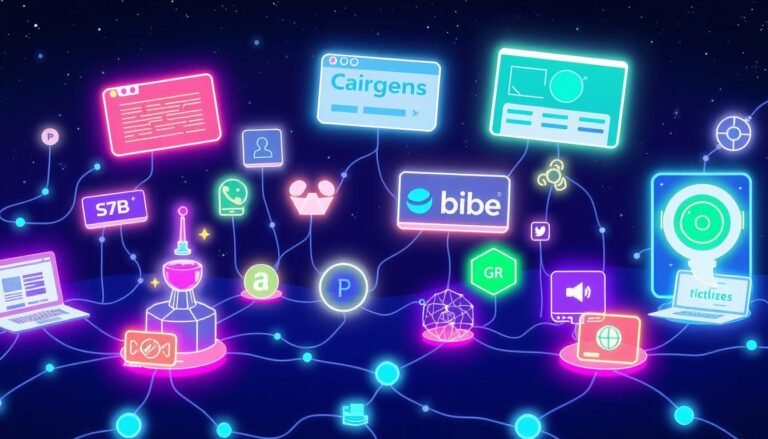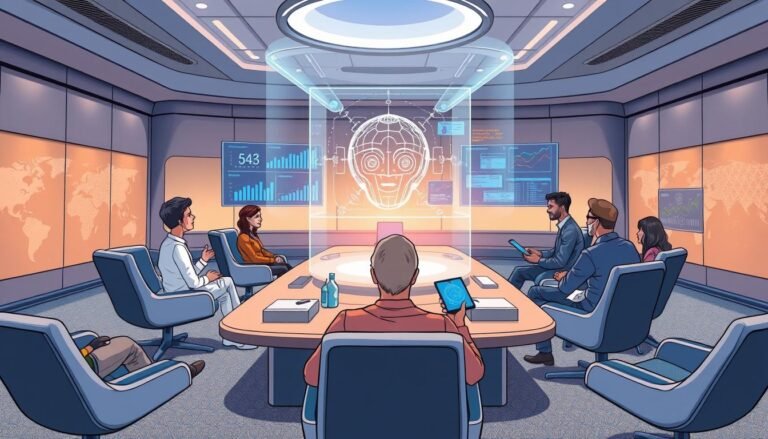The Ultimate Guide to Quantum Computing: What It Means for the Future of Tech
Did you know Google’s 54-qubit quantum computer solved a task in 200 seconds? This is incredibly fast compared to the world’s fastest classical supercomputer, which would take millennia. This shows how quantum computing could change the future of technology.
Quantum computing is changing how we process information. It offers a huge leap in computational power. These systems use quantum mechanics to solve problems that were thought impossible.
The quantum computing market was worth just $89 million in 2016. But it’s expected to jump to $949 million by 2025. This huge growth shows how much people believe in quantum computing’s power to change industries like cryptography and healthcare.
In this guide, we’ll look at how quantum computing works. It uses qubits instead of the usual bits. This lets it explore many possibilities at once. This change could open up new ways to solve problems and analyze data.
Key Takeaways
- Quantum computers outperform classical systems in specific tasks
- The global quantum computing market is growing rapidly
- Qubits enable simultaneous exploration of multiple possibilities
- Quantum computing has applications across various industries
- Challenges in quantum computing include maintaining qubit coherence
- Major tech companies are investing heavily in quantum research
Introduction to Quantum Computing
Quantum computing is changing our tech world. It uses the strange physics of tiny particles to process information in new ways. This is different from how regular computers work.
Defining Quantum Computing
Quantum computing uses quantum mechanics for calculations. Unlike regular computers with bits (0s and 1s), quantum computers use qubits. Qubits can be in many states at once, thanks to superposition.
The Emergence of a Revolutionary Technology
The quantum computing field is booming. In 2022, investors put $1.8 billion into quantum tech. This is a huge jump from 2019, showing how important quantum computing is becoming.
Why Quantum Computing Matters
Quantum computing can solve complex problems much faster than regular computers. Quantum algorithms use qubits in superposition to speed up calculations. This means quantum computers can solve problems that would take regular computers centuries.
- Quantum computers can find solutions in far fewer steps than conventional computers
- They can process massively complicated problems orders of magnitude faster
- The quantum computing industry is projected to reach $1.3 trillion by 2035
Exploring quantum computing shows its huge potential. It can change fields like cryptography and drug discovery. Quantum computing is not just about speed. It opens up new areas in science and technology.
The Fundamental Principles of Quantum Computing
Quantum computing uses the amazing world of quantum mechanics. It taps into the special properties of tiny particles for new ways to compute. This is something regular computers can’t do.
Qubits are at the core of quantum computing. They are like the bits in regular computers but can be in more than one state at once. This is called superposition. It lets quantum computers work much faster than regular ones.
Entanglement is another big idea in quantum computing. When qubits are entangled, changing one affects the other, no matter how far apart they are. This makes quantum computers super powerful for solving complex problems.
Quantum gates are important for working with qubits. They use special operations to change the qubits’ states. Quantum circuits, made of these gates, do tasks better than regular circuits.
Quantum computing offers exponential speedups for certain types of problems, promising significant advancements in drug discovery, materials science, and cybersecurity.
But, quantum computing has big challenges. Qubits are very sensitive to noise and need special care to stay stable. Solving these problems is key to unlocking quantum computing’s full potential in many fields.
Quantum Bits: The Building Blocks of Quantum Computers
Quantum bits, or qubits, are the heart of quantum computing. They are tiny but powerful, changing the tech world. Unlike regular bits, qubits can be more than 0 or 1 at the same time.
Understanding Qubits
Qubits are the main parts of quantum computers. They can be made from different things:
- Trapped ions
- Superconducting circuits
- Photons
Each method has its own benefits, making quantum computing a wide field of study. The Bloch sphere helps show how a qubit can be both 0 and 1 at once. This idea is hard to wrap your head around but is key for quantum computing.
Superposition and Entanglement
Superposition lets qubits be in many states at once. Entanglement connects qubits, making them even more powerful. These quantum tricks help computers solve big problems fast.
Quantum Gates and Circuits
Quantum gates change qubits, making quantum circuits. Unlike regular gates, quantum gates can work on many qubits at once. This lets quantum circuits change the whole quantum system, unlocking new powers.
Creating better qubit parts like amplifiers and processors with transmon qubits is a big step forward. As we keep improving, we’re getting closer to using quantum computers in many fields.
Classical Computing vs. Quantum Computing
The world of computing is changing fast, with quantum computing leading the way. Quantum vs classical computing marks a big shift in how we handle information. Classical computers use bits (0 or 1), while quantum computers use qubits that can be in many states at once.
Qubits’ unique ability lets quantum computers handle huge amounts of data at once. In contrast, classical computers get more powerful as they add more transistors. Quantum computers, however, get exponentially more powerful with more qubits.
Quantum computers are great for complex tasks. They can solve problems that would take years for classical computers to solve in just hours or minutes. This makes them perfect for tasks like cracking codes, finding new medicines, and improving financial models.
Quantum computers can be much faster than classical computers for certain tasks such as factoring large numbers, simulating quantum systems, and solving complex optimization problems.
But, quantum computers have their own challenges. They need very cold environments, often near absolute zero. They also struggle with error correction because qubits are very sensitive to noise.
As research goes on, quantum computing will change many industries. But, classical computing will still be important. Both will work together in the future of computing.
The Power of Quantum Parallelism
Quantum parallelism is at the core of quantum computing’s power. It lets quantum computers check many options at once. This makes them much faster at solving problems.
Exploring Multiple Possibilities Simultaneously
Quantum computers are different from regular computers. They use qubits to do lots of calculations at the same time. Qubits can be in many states at once, thanks to their special properties.
Quantum Speedup in Problem-Solving
Quantum computers are especially fast at solving hard problems. For example, Shor’s algorithm lets them figure out big numbers much quicker than old computers. This is a big deal for keeping data safe.
- Optimization problems in supply chain management
- Drug discovery through molecular simulations
- Climate modeling for more accurate predictions
Limitations and Challenges
But, quantum computing isn’t without its challenges. Keeping qubits stable and reducing errors are big hurdles. Scientists are working hard to solve these problems and unlock quantum parallelism’s full potential.
“Quantum computing is not just about speed, it’s about solving problems that were previously unsolvable.”
As we explore quantum technology further, the promise of quantum parallelism becomes more exciting. It shows us a future where complex problems are solved instantly.
Quantum Algorithms: Unlocking New Computational Capabilities
Quantum algorithms are changing the computing world. They use quantum systems’ unique features to solve complex problems quickly. This is because they can handle lots of information at once, thanks to superposition and entanglement.
Shor’s algorithm is a well-known example. It can break down big numbers much faster than old computers. Grover’s algorithm also makes database searches much quicker. These show how powerful quantum computing can be in many areas.
“Quantum algorithms demonstrate the potential for solving complex problems like integer factorization and database search exponentially faster than classical algorithms.”
Quantum algorithms do more than just help with security and data searches. They can also simulate molecules and chemical reactions very accurately. This could lead to new discoveries in healthcare and technology.
As quantum computers get better, we’ll see even more advanced algorithms. These will likely change fields like finance, climate science, and AI. They will open up new possibilities in how we solve problems computationally.
Applications of Quantum Computing in Various Industries
Quantum Computing is changing many industries. It’s making a big impact in finance and healthcare, among others. This new tech is helping us solve complex problems in new ways.
Cryptography and Security
Quantum Computing is a game-changer for cybersecurity. It can break old encryption but also creates new, secure ways to communicate. This is thanks to quantum key distribution.
Drug Discovery and Healthcare
Quantum Computing is speeding up drug discovery. It can simulate complex molecules, helping create new treatments and vaccines. This could save many lives.
Financial Modeling and Optimization
The finance world is excited about Quantum Computing. It can improve trading strategies and risk management. Goldman Sachs, JP Morgan Chase, and Wells Fargo are already investing in it.
Climate Modeling and Environmental Science
Quantum Computers are great at handling complex environmental data. They’re key for better climate modeling and predictions. This could lead to more accurate forecasts and smarter environmental policies.
The Quantum Computing industry is growing fast. A Boston Consulting Group study says it will hit $450 billion a year soon. The Quantum Technology and Application Consortium found 24 high-value uses across industries. This shows how versatile and powerful Quantum Computing is.
But, there are still hurdles. Building and programming Quantum Computers is tough. They need special skills and controlled environments. As research advances, more industries will use Quantum Computing to tackle big challenges.
Quantum Machine Learning: A New Frontier in AI
Quantum machine learning combines quantum computing and AI to solve complex problems fast. It uses superposition and entanglement to handle huge data sets in parallel. This could change how we use artificial intelligence.
Traditional machine learning has its limits because of classical computing. But, quantum machine learning can solve some problems much faster. For example, quantum support vector machines (QSVMs) are more accurate and quicker than their classical versions.
Quantum neural networks (QNNs) are promising for tasks like image recognition and natural language processing. They use quantum principles to explore many solutions quickly. This leads to faster training and better results.
- QML algorithms can perform computations exponentially faster than classical computers
- Applications span drug discovery, financial modeling, and particle physics
- Quantum Support Vector Machines capture quantum correlations more accurately
Quantum machine learning is still new, but it’s moving fast. Companies like 1QBit are working on quantum software for tasks like data classification. This is setting the stage for big advancements in AI and quantum computing.
As research and investment in quantum tech grow, we’ll see quantum machine learning open new doors. It will change the world of artificial intelligence in exciting ways.
Challenges in Quantum Computing Development
Quantum computing is facing big challenges. It’s hard to keep qubits stable and reduce errors. This makes progress slow.
Technical Hurdles
Building and keeping qubits is very complex. These quantum bits don’t last long and are easily affected by outside factors. To make stable qubits, we need very cold temperatures and special equipment.
Scalability Issues
Scaling up quantum computing is a big problem. Our current tech can’t grow well. We need new materials and tech to move forward. About 35.6% of quantum vendors say scaling is their main challenge.
Error Correction and Quantum Noise
Fixing errors in quantum computing is hard. We need many physical qubits for just one stable logical qubit. This problem, along with quantum noise, is a big challenge. In fact, 30.9% of experts say fixing errors is the biggest hurdle.
But, quantum computing is moving fast. 41.2% of industry pros say it’s advancing faster than expected. This shows we need to keep researching and innovating to beat these challenges.
Current State of Quantum Computing Research
Quantum computing research is moving fast, exploring new limits in computing power. Scientists and big tech companies are making big steps in this new field. We see progress in many areas.
IBM, Google, and AWS are leading the charge in quantum tech. IBM is working with Mercedes-Benz, ExxonMobil, and CERN. They’re using quantum computing for things like better batteries and smarter shipping routes.
- Amazon Braket: Providing access to quantum hardware platforms
- AWS Quantum Solutions Lab: Collaborating on projects like quantum algorithms for drug discovery
- AWS Center for Quantum Computing: Tackling fundamental challenges in error correction and scalable architectures
Quantum computers are incredibly powerful. They can solve problems in minutes that would take years or even centuries for regular computers. For example, simulating an element like thulium with 69 electrons would take over 20 trillion years with old methods.
Quantum computers provide the speed needed to mimic all aspects of chemistry, reducing the need for laboratory tests and increasing predictive capabilities.
But, there are still big challenges. A single qubit can cost up to $10,000. Simulating 300 entangled qubits would need more numbers than there are atoms in the universe. But, as research goes on, we’re getting closer to a future powered by quantum computers.
The Future of Quantum Computing: Predictions and Potential Advancements
Quantum computing’s future is bright, with big steps expected in the next few decades. It has already hit key milestones, setting the stage for major breakthroughs.
Quantum Supremacy and Beyond
Google’s achievement in 2019 showed quantum computers can beat classical ones in certain tasks. Experts think we’ll see quantum computers with thousands of qubits by the late 2020s. This could unlock new ways to solve complex problems.
Integration with Classical Systems
Quantum computing is becoming more connected with classical systems. Big names like IBM, Microsoft, and Amazon are offering cloud-based quantum services. This shows a big push to make quantum tech available to more people.
Quantum Internet and Communication
A quantum internet for secure communication is coming. It could change how we send data, making it almost impossible to hack. Countries like China, the US, and EU members are pouring money into quantum research, pushing the field forward.
The quantum computing market is expected to hit $65 billion by 2030, growing fast. This shows the huge potential of quantum tech in fields like medicine and finance. As quantum computing grows, it will change our tech world, leading to new discoveries and solving tough problems.
Quantum Computing Software and Platforms
Quantum computing software and platforms are changing fast. They give developers and researchers powerful tools to explore this new tech. There are two main types: Quantum Software Development Kits (SDKs) and computational platforms.
These tools help users create and test quantum algorithms. They push the limits of what’s possible in computing.
Big tech companies are leading in quantum software. IBM’s Qiskit, Google’s Cirq, and Microsoft’s Quantum Development Kit (QDK) are favorites among developers. Other important players include Rigetti’s Forest, Xanadu’s Strawberry Fields, and Zapata Computing’s Orquestra.
These platforms offer many features. They range from circuit design to algorithm testing. They suit both newbies and experts in the field.
The quantum software market is wide and varied. Companies like D-Wave, Riverlane, and QC Ware offer special solutions. Quantum Benchmark, for example, focuses on error characterization and mitigation, which is key in quantum computing.
As the field expands, we’ll see more new platforms. Each will tackle unique challenges in quantum computation. They’ll help us get closer to realizing quantum computing’s full potential.
Source Links
- The Future of Technology: Guide to Quantum Computing
- Quantum Computing in AI: The Ultimate Guide to Future Technology
- Ultimate Guide to Quantum Computing
- The WIRED Guide to Quantum Computing
- What Is Quantum Computing? | IBM
- Quantum Computing Demystified – Part 1 – Architecture & Governance Magazine
- What is Quantum Computing? [Everything You Need to Know]
- A Beginner’s Guide to Quantum Computing Fundamentals
- What is Quantum Computing? A complete Guide
- From Bits to Qubits – An Introduction to Quantum Computing
- Quantum vs. classical computers | Beginner’s guide
- Classical vs. quantum computing: What are the differences? | TechTarget
- Classical Computing vs Quantum Computing – Top 8 Differences
- The Ultimate Guide to the Future of Quantum Computing
- The Power of Quantum Computing: A Glimpse into the Future
- Unveiling Quantum Computing: The Next Tech Frontier
- The Future Of Quantum Computing Unlocking Unprecedented Power
- Industry Applications of Quantum Computing
- Industry quantum computing applications – EPJ Quantum Technology
- Quantum Machine Learning: A New Frontier in Artificial Intelligence!
- Quantum Machine Learning: The Future of AI Technology
- 9 quantum computing challenges IT leaders should understand | TechTarget
- 2024 Quantum Computing Report: The Current & Future State
- Quantum Computing: Current Progress and Future Directions
- AWS Quantum Computing Roadmap: Future Trends and Developments – SUDO Consultants
- The Future of Quantum Computing: Predictions and Trends
- The Future Of Quantum Computing: Trends And Predictions For 2024
- Unlock the Future with Quantum Computing: A Comprehensive Guide
- Quantum Software : What It Is & How It Works
- Quantum Computing 101: Demystifying the Future of Computing







